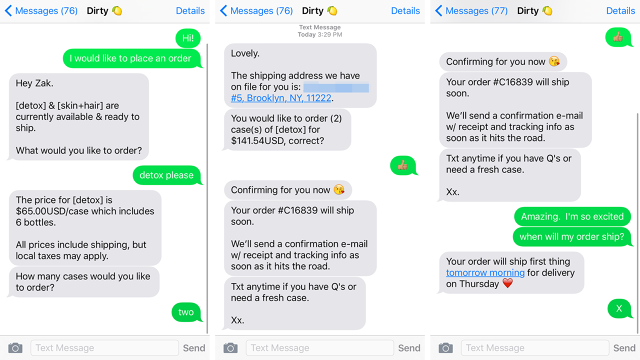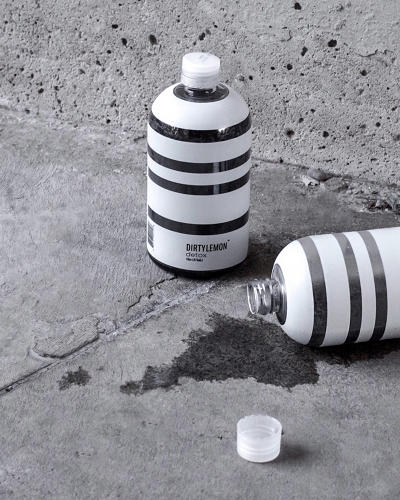Forget Dash Buttons, This Drinks Company Lets You Reorder By Text
I recently started drinking a new brand of supplement-infused beverages called Dirty Lemon. One is caffeinated with green tea to give you a jolt of energy as you start the day, another contains magnesium and chamomile to help you go to sleep. But the most interesting thing about the company wasn’t how the drinks tasted (a little tart and not too sweet), but how you reorder more once you’ve run out. You text the startup the way you might text your friend, “Yo, can you hook me up with more Dirty Lemon?” And you get a quick response, “Confirming for you now “
“
So far, Dirty Lemon is one of the very few companies that have developed an infrastructure to perform all customer interactions through SMS. Others that support text ordering, like Domino’s Anyware, developed a platform recently that offers customers the option to order up their pizzas via text, as well as through Twitter, Amazon’s Echo, and other channels. Still others, like subscription pet-product company Barkbox, allow customers to text orders, but they have to text the codes for each item.
Zak Normandin, who founded Dirty Lemon, thought that his product would be ideal for text ordering, so he baked that in from the beginning. The beverages are something you need to reorder on a regular basis, but you don’t want to go through the hassle of logging onto the brand’s website to place a new order. And Normandin, like many of us, does not like recurring subscriptions. “They make you feel locked into something,” he says. “And you might need more bottles before or after your next subscription is due.”

Since the text function was available when the company launched in September 2015, it’s hard to say whether SMS reordering has given Dirty Lemon’s sales an additional boost. The company claims revenue has grown 1400% since this time last year and receives over 50,000 text messages every month.
Building a platform for managing transactions online is a complicated business. Customers, unlike robots, don’t speak in generic phrases when they want to place an order, so what happens if the automated system doesn’t fully understand what an incoming text is all about?
Normandin worked with the communications platform Twilio to create the texting system, and payments are processed through Stripe. Early on, he discovered that it was important to make it easy for a human being to intervene if necessary. So when a customer says something complicated, it immediately triggers a customer service representative to get involved.
For instance, someone might text Dirty Lemon asking about which drink might work better for their lifestyle or explain a problem they had with their delivery. In cases like these, someone from the Dirty Lemon team will provide a more robust response. “It’s meant to feel seamless, so the customer doesn’t know when the texting bot ends and the customer service representative starts,” Normandin explains.
There are also other safety nets in place. If the automated system wants to process a payment, it first asks the customer to confirm the order. Only after it has received a “Yes,” will the order be authorized.

Many of these features came about through trial and error. At first, the system was much more rigid than it is now, without the ability for someone at the company to intervene if there appeared to be a problem. “As long as you followed the script perfectly, then your order would be processed,” he says. “If you didn’t, customers would receive a text asking them to email customer service,” he says, pointing out that a lot of beta customers sent plenty of annoyed emails.
Normandin has been tweaking (and tweaking some more), and he now believes this approach to engage customers via text is pretty watertight. He’s discovered that despite the advances in natural language processing technology, bots are still fairly limited in terms of how they can communicate. And in many cases, such as when a customer is upset, it’s really important to make them feel like there is a real human on the other end, providing a personal touch.

Normandin started Dirty Lemon because he felt there was a need in the market for beverages that do more than taste good and provide hydration. The first drink he came out with is the first national beverage brand to use activated charcoal, which is known for absorbing toxins and impurities in the system. “We believe that ready-to-drink beverages offer a level of convenience that popping a bunch of supplement pills does not provide,” he says. “Especially if these drinks are wrapped in a brand that consumers can relate to.” But they aren’t cheap. A six-pack costs $65, and shipping is free.
Along the way, he became fascinated with trying to create a satisfying, problem-free customer experience by text. Now, he says he receives daily emails from people asking how his platform works. He’s planning to create a spinoff business that helps other businesses implement text transactions. “We know there’s an opportunity here from a business standpoint,” he says.
Of course, texting to order only works with a certain type of product. It needs to be something that you buy with a level of frequency. Amazon has tried to simplify ordering for some items with the Dash Buttons, but you need a separate button for each product, and you can only use them for a small number of brands. Their current value leans more in favor of Amazon’s data gathering than consumer convenience.
Normandin’s platform can be set up with relative ease for any item a customer might want to reorder regularly, like snack bars, toilet paper, and printer cartridges. “I believe this will be the future of commerce in some way,” he says. “I’m not saying that every company will be using SMS to process transactions, but for a high-frequency item sold by brand looking for a more intimate relationship with their consumers, this is such a perfect solution.”











Fast Company , Read Full Story
(49)



